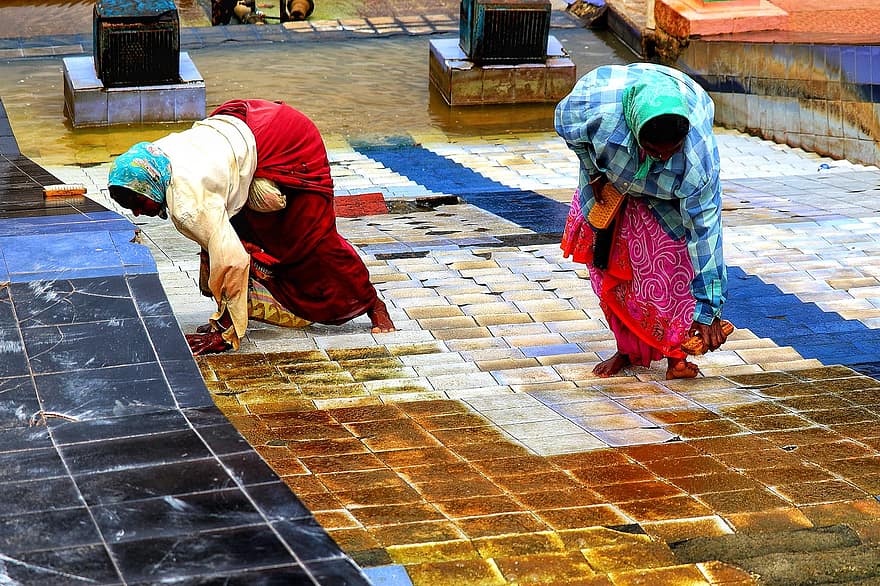The two women walk down my street at around 7 a.m. every morning, noticeable in the navy-blue knee-length coats they wear over their sarees, and the colourful bandannas that cover their heads. Bhagya (name changed to maintain anonymity) has large kaajal-rimmed eyes and she flashes a bright smile if she happens to see me on the terrace. There’s a man with them, and the three form the team that sweeps and gathers the street rubbish every day in my part of Hyderabad city. Their blue coveralls are printed with the letters signifying the municipal authority that employs them.
Well…if the relationship they have with that authority can be termed “employment.” Bhagya and her companions are contracted by the municipality through a third party. They are perhaps somewhat more fortunate than many others who are hired on and off on daily wages, but less so than the 37 % or so that are estimated to be on the permanent rolls of any urban municipal corporation in India. They are part of the crew that is responsible for maintaining the cleanliness of the city—an activity that was elevated to mission mode under the Central Government’s highly publicized “Swacch Bharath” (Clean India) scheme launched in 2014. While the building of toilets and eliminating open defecation were seen as top priorities under the scheme, the cleanliness of public spaces and ensuring safe and efficient waste disposal were also important goals. The scheme was dismissed by many as populist, and failing to tackle the real issues of caste-based inequity and deep-rooted social stigma faced by sanitation workers, but it did open up the discursive space around these issues.

The mission also succeeded in bringing more attention to the condition of workers like Bhagya—women and men working under precarious conditions of employment, subject to often unfair and nebulous contractual terms, and no safety net in case of health or other emergencies. An in-depth qualitative study by Dahlberg Advisors in 2017 categorized sanitation work into nine different types, ranging from cleaning latrines and drains to sweeping streets, each with its own challenges and vulnerabilities. More recently, a study by the NGO PRIA (Participatory Research in Asia) Network points to four “predispositions” that are the reasons for the persistent marginalization of sanitation workers—gender, caste, geography and education.
One does not need to look deep into the fine print of such studies to perceive the challenges that women in sanitation work face, being doubly marginalized by caste and gender. The PRIA study also pointed to the lack of empathetic supervision and little consideration given to the specific issues of safety and protection that women workers might require. These issues have been exacerbated by the Covid-19 crisis, with all categories of sanitation workers becoming part of an invisible frontline in the fight against the pandemic. A phone-based survey of 214 sanitation workers in three north Indian cities during this pandemic, of whom 30 % were women, revealed that they had received no instructions or training related to safety during the pandemic, nor had any special arrangements been made for them at work. Bhagya, for instance, told me that she was issued one set of gloves when she started working for the municipality three years ago, which have since torn and have not been replaced. When I asked her about face masks and hand sanitizer, she shook her head: “We have to get them ourselves if we want.” A simple cloth scarf was wound around her face in lieu of a mask.
The lack of information and the failure to provide basic protections results in a high level of anxiety, often leading to desperate measures. A 60-year-old sweeper in Telangana was reported to have taken her own life by consuming pesticides, fearing that she had been infected by the SARS-CoV 2 virus after having swept the streets in what was later declared a containment zone. In this and other reports, women sanitation workers are often referred to as “Covid warriors” but this terminology belies the very real vulnerabilities they embody. A majority do not have any form of health insurance despite the fact that much lip-service is paid to the fact that they are on the front lines of the pandemic.
Worker protections exist—in theory, and to varying extent—across all sectors; however, there are gaps at the level of making these protections, and knowledge about them, available to workers. When I ask Bhagya whether her contractor is supposed to give her protective gear, she shrugs, and says “Who knows?” While one might see this as apathy or complacence, it’s more likely to be a simple lack of awareness of what one is due and how to demand it. Of course, there is also the possibility that the exercise of voice might just put her job at risk.
When we talk of communication rights, it is often limited to access to means of communication and the freedom of expression. But within a human rights framework, communication becomes the means by which we access a whole range of other rights—including the right to fair work.
Some days, as I look down from the terrace, I see Bhagya walking a few feet behind her companions, talking on her phone. What if this phone became a means—not only of domestic communication, but also, to access a checklist of protections, a means to report on lapses, and a way to connect with others in her cohort? What if it were not an instrument of surveillance (as has been used to monitor activity under Swacch Bharat in some regions) but an instrument of security, care and supportive connection?
I guess that’s a question for another day.
——




